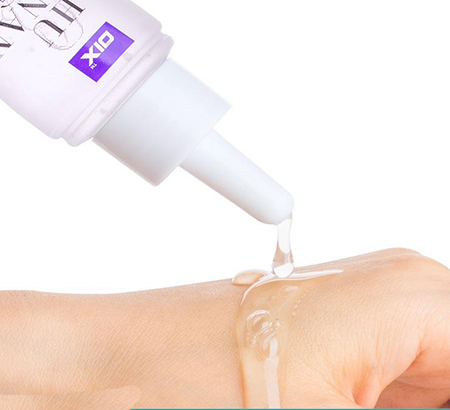What is skin Hives? And how is it treated?
A red, itchy rash appears on the skin and comes in different shapes and sizes, each lasting six to 12 hours. Hives can change quickly and disappear in one place and reappear in other places, often within a few hours.
urticaria = hives
Urticaria occurs suddenly and is sometimes caused by direct stimulation of stimuli such as heat, cold, and sunlight. Antihistamines are the most common treatment for hives. Hives are not usually associated with long-term or serious side effects.
What are hives and angioedema? What does it look like? Some important points about urticaria:
Red and very itchy urticaria appear on the skin and swell. They appear in different shapes and sizes, from a few millimeters to a few centimeters anywhere on the body.
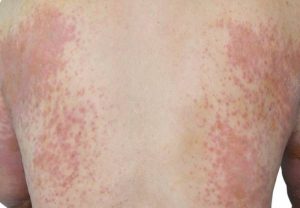
It is estimated that 20% of people develop hives during their lifetime.
Urticaria is more common in women than men. One of the hallmarks of urticaria is rapid resizing and movement, disappearing in one place and appearing in other places, and often occurs within a few hours.
Hives usually last 24 hours. This outburst, which seems dramatic and even annoying, can occur in the morning and disappear completely at noon.
Skin diseases are sporadic and go away quickly. Even if you do not have any signs of hives to show your doctor, go to his office for an examination; he can diagnose it by carefully examining the symptoms and determining the symptoms.
Deep swelling in the skin that may be accompanied by urticaria is called angioedema. This swelling of the hands and feet and the face (lips or eyelids) can be significantly shorter.
What are the causes of skin urticaria?
What causes hives and angioedema? Is urticaria contagious? Could stress be the cause?
- Urticaria occurs when histamine and other compounds are released from cells called fistulas, commonly found in the skin. Histamine leaks fluid from local blood vessels and causes the skin to swell.
- Urticaria is very common and not contagious. Although annoying, they usually get better within a week and rarely require serious medical treatment.
- Allergies may cause some hives to certain foods, medications, food coloring, preservatives, insect bites, and gases and chemicals, but there is no specific cause in most cases. Although people may be upset that they do not know what causes hives, things like diet changes, soap, detergents, and makeup rarely help prevent urticaria.
- Because urticaria is often produced by the immune mechanism but is not contagious, if an infectious disease causes hives in a particular person, it is possible. Still, contact with someone infected with urticaria is unlikely to be transmitted to you. Having hives may cause stress, but stress alone does not cause hives.
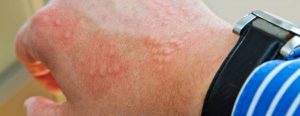
What are the different types of urticaria?
Acute urticaria (normal hives that go away after six to eight weeks) and chronic hives (which last for more than 6 to 8 weeks) because urticaria is very common and resolves its own.
What are the signs and symptoms of natural urticaria?
Common hives occur suddenly and usually occur for no apparent reason and often appear to occur in several parts of the body. They are itchy and swollen and go away a few minutes to a few hours before appearing elsewhere. This can last from days to weeks, and most hives go away in less than six weeks. If they take more than six weeks to heal, they are called “chronic urticaria.”
What are the risk factors and causes of natural urticaria?
As mentioned above, many cases of hives are usually “idiopathic,” meaning that they have no known cause, and some urticaria may be caused by medication.
When a drug is identified as one of the causes of hives, it should be discontinued. In most cases, the drug-induced urticaria resolves within a few days. If the medication is stopped and the urticaria does not go away, this is a strong sign that the medication has not caused the hives.
Some drugs, such as morphine, codeine, aspirin, and other nonsteroidal anti-inflammatory drugs (NSAIDs), such as ibuprofen, cause the body to secrete histamine and produce urticaria through the body’s mechanism. People with hives should avoid these drugs.
Chronic urticaria (lasts more than six weeks):
This may take months or years. The disease is difficult to assess, and allergy testing and other laboratory tests are only helpful in some cases. Accurate assessment of these conditions requires the patient to provide accurate information about their complete medical history, personal habits, and oral intake.
Sometimes it may be necessary to stop taking certain foods or medications for a while to see the effect on the skin condition.
Some systemic diseases and infections, including parasitic infections, can sometimes cause hives on the skin. If the cause is identified, specific treatment should be effective, or food or drug allergies should be avoided.
There are rare forms of chronic hives when a patient produces antibodies against molecules on the surface of their cells tested for this type of urticaria.
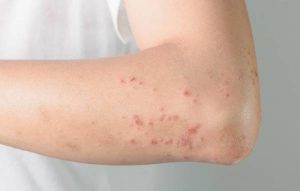
Physical urticaria (e.g., heat urticaria):
It is a type of chronic urticaria produced by physical stimuli. Common environmental stimuli such as sunlight, water, cold, heat, exercise, and stress sometimes cause hives.
This is an exaggerated form of what happens to anyone when their skin is scratched, and the area first turns red. Itchy red blister spots appear where the skin is scratched and damaged because these lesions leak histamine.
Another common type of physical hives is called “cholinergic urticaria.” It causes hundreds of small, itchy bumps and This occurs during 15 minutes of exercise or physical activity and usually disappears before a doctor’s examination and often occurs in young people.
Are there other conditions that cause hives?
There is another rash that may seem like hives, but the fact is that it does not get better after 24 hours. Such a rash may require examining a small sample of skin under a microscope (sampling) to determine the exact nature of the skin condition.
When to see a doctor:
If you have trouble sleeping with hives, you may need to see a doctor, especially if you take over-the-counter antihistamines. If the urticaria lasts for more than two months, it is best to see a doctor.
Which doctors can treat urticaria?
Some family physicians or internal medicine specialists can easily care for patients with chronic urticaria. Most dermatologists and allergists can care for and treat patients with urticaria.
What causes urticaria?
Talk to your doctor to find out exactly what type of urticaria you have. However, keep in mind that most hives are annoying, serious, and almost always temporary.
Natural home remedies to get rid of urticaria quickly:
Even if the hives are varied in shape and size, you will still be very tired or irritated. Hives occur without warning and can take hours or even days, depending on the severity of your problem.
What is the main reason for this?
A sudden attack of urticaria can occur for a variety of reasons. The secretion of histamine often causes this allergic reaction, and the exact cause of urticaria has not yet been proven by medical science. Here is a list of possible factors:
- Gluten, nuts, milk, eggs, soy, oysters, tomatoes, and some other foods
- Our chemical products are talc powder, perfume, and spray
- Aspirin, ibuprofen, supplement inhibitors, and some other drugs
- Sudden changes in weather conditions
- Intense emotions
- Bites or bites by insects
Discover the common symptoms of urticaria:
- Reddish pink handles on different parts of the body
- Itching and swelling
- Deformation, disappearance, and return
- Burning sensation in the palms of the hands, feet, around the eyes
- Warming up, getting wet, and getting emotional
- Unpredictable and repetitive patterns
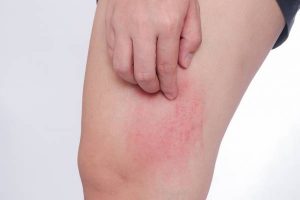
Use these natural methods to get rid of skin urticaria:
Cool bath
A cool shower or bath is, without a doubt, one of the easiest ways to treat the itching. For deep skin inflammations, water treatment can be effective; if you have urticaria, do not bathe in hot water.
Cold compress
The use of ice packs and cold packs is one of the most popular home remedies for urticaria. Instead of ice packs, you can also use a package of frozen vegetables. Wrap a thin layer of cloth around the cold sheet and gently press on the affected areas of your body. Do this three times a day and leave it for 10 minutes, or until you feel dizzy.
Aloe vera
Aloe vera is one of the best home remedies for hives. Regular consumption of aloe vera juice helps a lot in the detoxification process; however, drinking aloe vera juice is not recommended for children and pregnant or lactating women. Gently massage aloe vera gel on your body, leave it on for 15 minutes, and then wash it off. Repeat this several times a day for quick relief of urticaria.
Baking soda
Sodium bicarbonate or baking soda is readily available and helps cure urticaria quickly. Mix a teaspoon of baking soda in a glass and mix this water in large quantities all over the body’s breast, neck, and other parts.
Basil
With the help of this powerful natural antihistamine, it is used for skin diseases and those who have itching. Pour a tablespoon of basil leaves (dry) in a clean bowl and add hot water. Put the glass down and let it cool. Take a piece of dry cotton cloth and put it in the mixture, and then put it on your body.
Oatmeal
Oatmeal always softens the skin and is very useful for urticaria in children. Wash 2 cups of oatmeal and add enough water to make a smooth dough. Add two tablespoons of cornstarch to the mixture and mix well. Apply this paste on your skin, leave it for 15 to 20 minutes, and then wash it off.
Magnesium milk
Magnesium milk is another reliable solution for people with urticaria, especially in relieving itching.
Teabag
The tea bag is highly recommended due to its sedative properties and helps with itching. Put a teabag in boiling water for about 10 minutes, let it dry, and then put it on your body for 15-20 minutes.
mint
Due to its antioxidant and cooling properties, mint is one of the most popular ingredients to fight urticaria. Chop a few fresh mint leaves and put two teaspoons of them in boiling water for a few minutes. After boiling, cool the liquid and wash your affected areas 5-6 times a day.
Apple cider vinegar
Treat hives naturally with apple cider vinegar. Pour a few cups of apple cider vinegar in the tub and soak your body in the tub for 15-20 minutes. You can also make a mixture of a teaspoon of apple cider vinegar, lemon juice, and a few drops of honey (to taste). Drink this liquid twice a day.
Treatment of urticaria with Epsom salt
It is possible to treat hives with fast Epsom salts. Dissolve some Epsom salt in drinking water and soak your body in this water for about 20 minutes.
Repeat this every day. Avoid chemical soaps or oils during this treatment.
Eliminate urticaria with henna
Henna is another quick treatment option. Make a henna solution and apply it to the damaged parts of your skin and be careful because too much rubbing will irritate your skin more.
Oatmeal bath
Pour a few tablespoons of powdered oatmeal into the tub and stir. Bathing is always one of the most common home remedies to eliminate urticaria and many other skin problems.
Treatment of urticaria with ginger
Due to its excellent anti-inflammatory properties, are always a reliable element to improve various physical effects and act as an antihistamine to quickly eliminate urticaria.
Peel a squash, grate it and squeeze the juice. Drinking ginger tea or chewing fresh ginger strengthens your immune system.
Turmeric
Turmeric is an important anti-inflammatory substance and plays a perfect role in fighting inflammatory diseases. It is a natural antihistamine and helps you get rid of urticaria quickly. Add a teaspoon of turmeric powder to a glass of water or milk and drink it regularly.
Try to include turmeric in your daily routine, but avoid taking turmeric if your doctor prescribes it.
Blue Skullcap
Blue Skullcap is rich in flavonoids that are anti-inflammatory as well as anti-allergic. It helps stabilize many allergens and reduces humid heat conditions such as fever and hives.
Calamine lotion
Applying calamine lotion on the affected areas helps to relieve skin irritation temporarily.
Nettle
Nettle is on the list of natural antihistamines and also has anti-inflammatory properties. Highly recommended to help with itching as well as eliminate swelling. You can add a tablespoon of nettle leaves (dry) to a cup of hot water. Leave it for 15 minutes, strain the liquid, add a few drops of honey, and try to consume it twice a day.
Bromelain
This special enzyme in fresh pineapple is a potent anti-inflammatory. Reducing allergy response systems eliminates urticaria, improves several other skin irritation types, and puts it directly on inflamed skin to get a positive result.
Sugar solution of vinegar and ginger
Add a tablespoon of ginger and a quarter cup of brown sugar to 3/4 cup vinegar. Boil this mixture for a long time and let it cool. Dissolve a small amount of this solution in drinking water and apply it to the rash on your face and body.
Licorice
Licorice increases cortisone levels and has excellent anti-inflammatory and anti-viral properties. Choose a lotion containing licorice extract.
Green tea
Green tea contains many polyethylene and flavonoids; this active antioxidant works wonders for your immune system and eliminates various types of allergic inflammation such as urticaria. Try replacing your morning coffee with tea and adding a little lemon juice. This is especially useful for removing toxins from the body system.
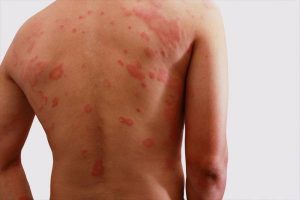
Ways to prevent skin urticaria:
In addition to taking home remedies to get rid of urticaria, these simple precautions can play an important role in keeping you away from future hives attacks:
- Avoid hot water
- Use loose clothing and soft, natural fabrics
- Avoid direct sunlight
- Work on reducing stress levels
Be sure to see your doctor if you have any unusual symptoms and dizziness, painful swelling of the tongue, lips, throat, chest tightness, and breathing problems.

